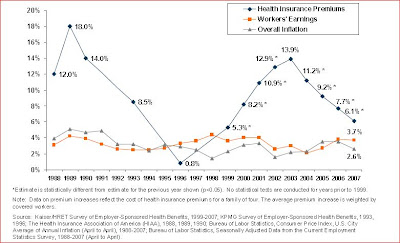While no one should come to any conclusions about any allegations until all the facts are known, one thing is certain: Mr. Jackson is a poster child for the downsides of having unfettered access to all the health care anyone could ever want. Dissatisfaction with a first round of plastic surgery and insomnia are common place, but few patients have the resources to go on to decimate their nose and turn their bedroom into an anesthesia suite.
Which brings up a good point. Regular DMCB readers are well aware of this graph from the Kaiser Family Foundation report on Trends in Health Care Costs and Spending:
Back in the late 1990s, many HMOs made the mistake of controlling costs by aggressively denying payment for anything that didn't meet their definition of "medical necessity." When it came to costs, it worked quite well. While that style of managed care has since been defanged, health insurers including HMOs continue to apply a gentler, more transparent, regulated and still evolving standard of only covering treatments that are 1) appropriate and 2) effective when 3) there are no other safer alternatives.













No comments:
Post a Comment